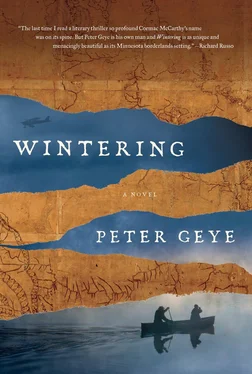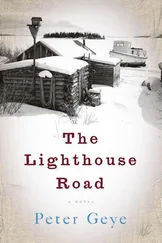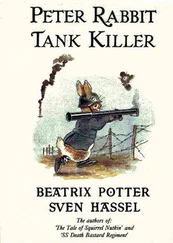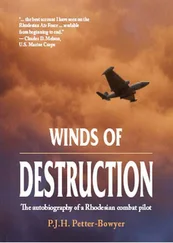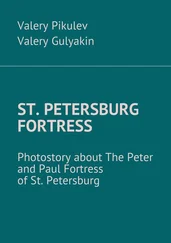One of the joists crashed down and sprayed fire in every direction, blasting Gus out of the doorway and onto his back in the snow again. When he looked up his father was beside him, the bearskin in one hand, the Remington in the other.
“Is the pistol in your pack?” Harry asked.
Gus nodded yes.
“Loaded?”
Gus nodded again.
“And the maps?” Harry said.
“Yes.”
They had to shout in order to be heard over the roar.
“What else you got in there?”
“Tent. Change of clothes.” Gus unbuckled the Duluth pack quickly and dug through it. “Rope. Field glasses. Canteen. Compass. Saw and hatchet. Some chow.”
“Here.” Harry magically produced one handful of dried fruit and another of chocolate bars and stuffed them into the pack. When another ceiling truss crashed to the floor, Harry flinched and looked around blindly, then turned to face the darkness. “Goddamnit,” he said. “Goddamnit.” He checked the Remington and realized the cartridge was empty. He dropped the gun, stepped toward the burning shack, paused for a heartbeat, then made a second dash inside.
Gus followed, shouting for him to stop. But in the inferno his father either couldn’t hear or wouldn’t listen and Gus could only stand there, the heat from the fire masking the bitter chill of the air. He could feel the first on his face, the other at his back.
It was only a few short seconds before Harry dove from the doorway and landed on his coat, which he’d covered his head with. Standing up, he tossed Gus the ammo and pulled his coat on. Then he grabbed the snowshoes from the snowbank where they’d been lodged, handed Gus a pair, stepped right next to him, and spoke softly into his ear, as if to keep these instructions secret from the flames.
“Put those on. Make sure everything’s in the pack and get over to the oaks as fast as you can.” He reached into the pack and pulled out the Ruger, checked that it was loaded, flipped on the safety, and handed it to him. He leaned again to Gus’s ear. “Wait for me in that blind you were using. Don’t make a sound. Keep alert. Be ready.”
Gus did exactly as his father said. He stuffed the bearskin and sleeping sack in the pack, cinched it up and buckled the straps, pulled it on his shoulders. He slipped the tumpline over his forehead and looked around to make sure he had everything while he strapped the holster around his waist.
And then his father was gone. Gus had no idea if he’d disappeared back into the shack or out into the woods or simply turned to smoke himself. Panic welled up but he quelled it as fast as he’d felt it and ran through the weakening glow of the fire until he was halfway across the lake, where there was no light at all. He ran hard, his lungs burning, the snowshoes landing softly and soundlessly on the snow, the Duluth pack clumping against his back. He glanced over his shoulder twice but saw only darkness and the distant fire blooming beyond it.
When he reached the shore he stood behind the nearest tree. Slumped over with his hands on his knees, he finally caught his breath and looked back across the bay. He felt the wind on his face and soon could smell the fire, faint and almost pleasant from a quarter mile away, and growing even as he watched. He heard the boom of the roof collapsing, and in that same exhalation the cache and the closest trees were set ablaze. The glare of the flames was now even brighter and he thought by some miracle he could feel their heat from where he stood. Was such a thing possible? Through all of that cold, could the heat abide?
He peeled the tumpline from his forehead and let the pack slide from his shoulders. He checked the pistol himself, then sat on the pack with his back against the tree. Could he really have been sound asleep in his bunk ten minutes ago?
—
It might’ve been an hour later and the fire still burned. The shack was rubble except for the fieldstone chimney. The cache was gone and two trees next to it stood naked of boughs, totems to that unholy night.
Shocked, sitting there against the tree, he felt a strange relief. For the first time since they left home in October, there was only one thing to do. It might be impossible, and they might get killed or die along the way, but there was no uncertainty anymore. Go south and east until they got home or died. Go fast and don’t ever look back.
Gus had hardly moved. He sat shivering against the tree, staring as the firelight across the bay faded in gradations until there was none left at all. He looked up at the sky and saw only the black dome of the cloud-covered night. He reached for the holster and gripped the Ruger. There was nothing left to think about. There was only the waiting, so he closed his eyes and did.
What came next was a voice not his father’s calling out of the night, from the frozen bay. There was a loud, wolflike howl and then Charlie Aas shouted, “Now for the fun part, you lousy sons of bitches.”
Gus pressed his face against the bark of the tree and felt his pulse from his temples to the soles of his feet. He peeked over his shoulder and saw him silhouetted against the firelight perhaps fifty yards offshore. Gus could see him switch a rifle from one shoulder to the other.
“All these years you fool Eides have bird-dogged with the Riverfish clan,” he shouted, his voice seeming nearer than his body, “and still you don’t know any better than making a trail like a circus leaving town? Old Freddy could track a trout up a stream, that one. But a blind man could follow these tracks. A blind man in the pitch dark.” Charlie played a flashlight over Gus’s tracks, shining the beam left and right, then lifting it into the woods, where Gus pulled his face behind the tree with the rest of him. The light couldn’t reach him but he was glad when Charlie turned it off.
“Of course,” Charlie called, then moved forward. “It’s only one of you pucker-assed pansies.” He switched the light back on and circled the beam all around; then it went out again. “I ain’t been shot yet. That must mean it’s young Eide on the yonder shore.” He cupped his ear and took several more steps toward the shore. “That right? You hiding in those trees, Gus?” Now he straightened up. “You’re every bit the candy ass your old man is, ain’t you, now? The world hates a gutless man.”
He lowered the gun to his waist and pointed it into the woods. “You got the dark on your side. I’ll grant that much. But soon the day will break. If you haven’t learned a goddamn thing playing woodsmen, I bet you figured that out.” He kept moving. “Tell me something, Gussie, you spend much time up here thinking about my daughter with your hand in your pants? You little fuck, you. You poisoned that girl. Yes, you did.” He took another step, and now Gus could make out the brim of his hat and the tufted fur of his open coat. “I’m gonna turn you into a damn eunuch. I got a bowie knife here could cut the balls off a dinosaur.”
Gus took a gulping breath and thought surely Charlie could hear the drumming of his heart and see the terrified whites of his eyes. Without moving his head, he looked to see the clouds breaking up and the starlight showering down. He slowly lowered his hand onto the pistol grip.
“You’ve been given every disadvantage,” Charlie barked. “I understand that. But the world makes no exceptions and neither do I. You should know it ain’t your fault you got found out there. Not one little bit. I want you to die knowing that much. But you should know it was your old man letting you down again. See, it was the smoke from his fire that put us onto you. We been hunting you boys for three weeks now. Might not’ve found you, either, if you’d saved your fires for the dark, like we did.”
Gus snapped the holster, slipped the Ruger out, and held it against his leg. After a long, slow breath he flipped the safety off, then slid down the tree trunk and lay prone on the snow behind the Duluth pack. He elbowed up onto it and raised the pistol. With his left eye closed he sighted Charlie Aas out on the ice.
Читать дальше
